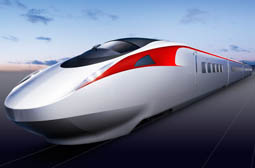New 350km/h High-speed Train efSET aiming at the Global Market
Sep. 11, 2008

|
Tokyo, September 11, 2008 — Kawasaki Heavy Industries, Ltd. announced today that it has decided to set out the development of the new high-speed train efSET*. This is Kawasaki’s autonomous new high-speed train development project that has an eye to the global market and is a completely new initiative when compared to its previous job-to-job rail car development projects carried out both home and abroad. Kawasaki is becoming the first-ever Japanese rail car maker to introduce a self-developed high-speed train to the global market. Kawasaki’s new high-speed train efSET which is currently under development will achieve a service speed of 350km/h and, simultaneously, this innovative vehicle contains the technologies, which Kawasaki has developed through the designing of a number of high-speed trains, that improve the level of passenger comfort and reduce the loads on neighboring environments. The development is expected to be completed by the end of March 2010. Kawasaki is a rail car maker with a longstanding history of designing and manufacturing of Shinkansen trains, ranging from the Series 0 Shinkansen trains which came into service in 1964 up to state-of-the-art Shinkansen trains, with an abundance of outstanding performances and expertise involving high-speed train design and manufacturing. For example, Kawasaki supplied the Series 700T trains to the Taiwan High Speed Rail in 2004 and the CRH2 trains to the Ministry of Railway, China in 2006. Based on the sound performance of these trains, Kawasaki has been able to build a strong platform in the Asian high-speed train market. The importance of rail cars have been reviewed in recent years on a global basis as they are capable of providing mass transport with a smaller amount of greenhouse-gas emissions. A number of countries including the United States, Brazil, Russia, India and Vietnam are currently carrying forward new and specific construction plans and, as a result, approximately 10,000km express railway tracks are expected to be newly built in the next twenty years on a global scale. In response, the demand for express trains will likely to increase. Under these market circumstances, European rail car makers are working towards producing self-developed high-speed trains and introducing these trains to the global market. Kawasaki has accordingly identified the strong requirement to carry out the autonomous development of a world-class high-speed train in the quest to outdo these European competitors so as to receive orders on a global basis. It has thus reached a decision to set out the development of efSET. In collaboration with domestic railway companies as well as both domestic and foreign equipment and part manufacturers, Kawasaki intends to carry forward the development of a user-friendly and highly reliable high-speed train. * efSET is a new high-speed train and is an abbreviation of Environmentally Friendly Super Express Train. |





